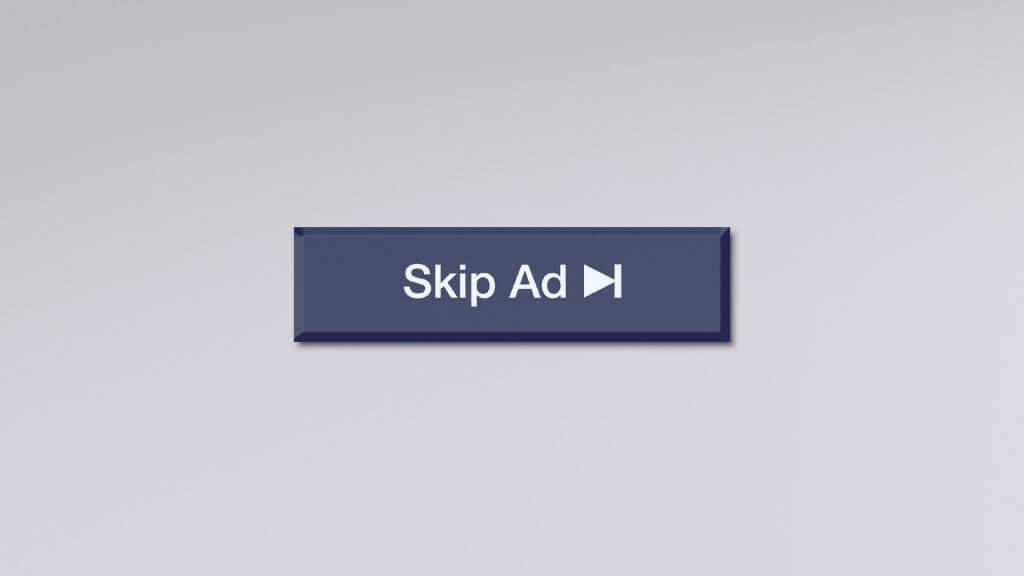A few years ago, if you wanted to get out of harm's way during a cosy TV evening before the commercial break, you basically had only one option: disappear to the toilet. The invention of the remote control made life easier for many of us and at the same time reduced water consumption. Today, we watch more and more TV on our digital devices, on whatever channel, and have installed a self-defence app called AdBlock or something similar.
Everyone hates advertising.
Whenever I do a workshop or give a keynote, I ask the audience: "How many of you like the pre-roll commercials before the video you want to see?" The answer without exception: no one.
Consequently, the most clicked thing on YouTube is neither a cat video nor one about a spectacular sporting event or about someone who is particularly stupid or beautiful or both, or simply named Kardashian, but skipping commercials.

In the vast majority of cases where I am targeted with these advertising videos, I am presented with products that are absolutely irrelevant to me, and this despite the fact that there are probably more cookies placed on my devices than in Oreo's central warehouse. Recently, I was pushed interruptive ads into a video on Facebook for the first time. It was for a product I didn't know, at least made for the Asian market.
Why, after I have bought a product, does Amazon regularly send me advertisements for that very product? Admittedly: Anyone who buys clothes hangers is definitely interested in clothes hangers, but also says at the same time: "I've got enough clothes hangers now, for the next few days at least."
Why does everyone hate advertising so much that many even spend money on it so they don't have to see any more?
Everyone loves advertising.
In the USA, Christmas comes twice a year for those who produce advertising. Once, when Santa Claus, and when the Super Bowl is just around the corner. Then commercials are produced with a lot of heart and effort and often a lot of money. Stories that touch people, that they talk about, that they share.
Why does everyone suddenly love advertising so much that they even send the spots to each other? I suspect there are three clues to the answer:
-
Stories that touch people.
-
Heart and soul
-
Effort
And I am firmly convinced, as many examples also prove, that big budgets have less to do with success than those who spend the money claim.
It is always remarkable to me that these commercials are usually emotionally very high, but at the same time often so far away from the brand story that not even the claim of the brand can be inserted. - On the other hand, everyone can do what they want with their advertising money, even if it's only Christmas once a year.
The angel of death of advertising is coming of age.
The members of the so-called Generation Z, the group on which everyone who wants to sell something will focus in the near future, are the angels of death of advertising as we know it. And some of them are already adults, so depending on the mode of calculation, even over 20 years old.
What do brand owners need to know about Generation Z if they want to sell to them? First and foremost, they hate brands that want to sell them something. They are faster, smarter and more ruthless than any company can be and also faster, smarter and more ruthless than the fastest, smartest and most ruthless companies fear.

At the same time, research shows that this generation in particular loves brands that have a so-called purpose, i.e. that create a relevant benefit in the lives of their audience that goes beyond the product benefit. These can be so-called good causes , but they don't have to be.
The youth of today are just as terrible as their grandparents.
Complaining about the decreasing attention span of today's youth misses the point - just as complaining misses every point in principle. What has actually decreased is the span of interest and the tolerance to be bombarded with irrelevant shit. In this, by the way, Generation Z kids are in complete agreement with their parents and grandparents. Strictly speaking, people don't really hate advertising. They just don't want to be bothered.
How to expand this span of interest? I know of three clear clues to the answer:
-
Stories that touch people.
-
Heart and soul
-
Effort
There are three simple fundamental truths behind this:
-
The story can never be about the brand and must always be about the audience.
-
The brand is not the hero, the brand must make its user the hero.
-
For a brand to get quality time with its audience, it must be relevant. That means ... (see 1).
The key to success lies in the cassette labelled "Relevant Values". Because as soon as and only when a brand story is animated by values that touch a longing in the audience, a storyworld is created in which brand and audience meet and interact and spend precious Time with Brand together. And then a really strong bond is woven.
For all those who say: "You can't do that with my brand!" I have a fitting answer: "Do what you can't" before their competitor says: "Watch me . .."
And even if storytelling is now driven through every village as an annoying buzzword, the following applies to all companies, brands and organisations, regardless of whether they want to engage in conversation with young or old people: "No Story. No Glory."
